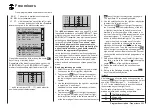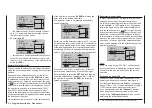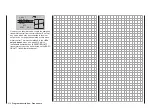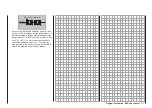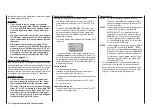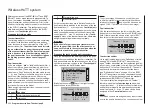
216 Program description - MIX-only channel
MIX-only channel
Separating control functions from control channels for all flight phases
This option is available as standard on the
mc-20
HoTT transmitter only.
Use the selection keys of the left or right
four-way button to scroll to the »MIX-only
channel« menu option in the Multi-function menu:
Fl. phase timer
Wing mixers
Dual mixer
Free mixers
MIX active/phase
MIX-only channel
Fl. phase timer
Helicopter mixer
Dual mixer
Free mixers
MIX active/phase
MIX-only channel
Open this menu option with a tap on the center
SET
key of the right four-way button:
Mix-only channel
only
normal
1 2 3 4 5 6
This menu can be used to interrupt the normal signal
flow between the input side control function and the
output side control channel, therefore the “classic”
control-to-servo connection is actually separated.
Use the potential offered by this flight phase inde-
pendent menu, particularly to keep one of the control
channels “free” in all flight phases from assignment to
a transmitter control or switch for specific flight phas-
es in the »Control adjust« menu.
Conversely of course, such a stick, transmitter control
or switch “robbed” of its servo can still be used freely
as a control in other way – indeed even in flight phase
dependence – , refer to the programming examples at
the end of this section.
A stick, transmitter control or switch robbed of its
servo by setting the channel to “MIX only” will then
namely affect mixer inputs only …
… and the servo connected to a channel set to “MIX
only” is then also only accessible from the mixers pro-
grammed to its control channel, i. e. “(with) MIX(ers)
only”.
Accordingly, for any channel set to “MIX only”, you
can utilize both its control function and its control
channel entirely independently of one another for
any special functions you need; see the examples
at the end of this section. A further option provided
by a channel set to “MIX-only” status is the facility to
program timed sequences using a mixer programmed
to the same channel, and set up using the “- Time
+” option of the »Control adjust« menu; see pages
118 and 122. See page 308 for a programming
example.
Basic programming procedure
Use the Select buttons of the left or right-hand four-
way button to select the desired channel 1 to 8 (
) on
the standard eight-channel
mc-16
HoTT transmitter
…
Mix-only channel
only
normal
1 2 3 4 5 6
Mix-only channel
only
normal
7 8
… or 1 to 12 (
) on the
mc-16
HoTT transmitter
with twelve channels unlocked, and the standard
twelve-channel
mc-20
HoTT transmitter.
Use the selection keys on the left or right four-way
button to select the desired channel to switch at will
between “normal” ( ) and “MIX only” ( ) modes:
normal
7 8 9 10 11 12
Mix-only channel
only
Examples:
• For model glider aircraft without airbrakes, the but-
terfly function, page 183, is generally used as a
landing aid. Just as with “normal” airbrakes, this is
generally controlled using the C1 stick. While the
(airbrakes) servo typically connected to channel 1
is then generally absent as a rule, receiver output
1 is still not “free”, since the control signal of the
brake stick is still present at this location.
Its control signal – which in this specific case is not
desired – can be decoupled from control channel
“1” to thus “free up” this channel from the C1 stick
signal by setting channel 1 to “MIX only” in the
»MIX-only channel« menu. This makes it possible
to use control channel “1”, together with receiver
connection “1”, at any time for other purposes, via
freely-programmable mixers – e. g. to connect up a
speed controller.
mc
16 20
Summary of Contents for HoTT MC-16 Series
Page 1: ...Programming Manual mc 16 mc 20 HoTT 1 en mc 16 mc 20...
Page 27: ...27 For your notes...
Page 53: ...53 For your notes...
Page 61: ...61 For your notes...
Page 65: ...65 For your notes...
Page 71: ...71 For your notes...
Page 103: ...103 For your notes...
Page 107: ...107 For your notes...
Page 111: ...111 For your notes...
Page 155: ...155 For your notes...
Page 165: ...165 For your notes...
Page 201: ...201 For your notes...
Page 229: ...229 For your notes...
Page 231: ...231 For your notes...
Page 261: ...261 For your notes...
Page 265: ...265 For your notes...
Page 301: ...301 For your notes...
Page 327: ...327 For your notes...
Page 328: ...328 For your notes...




